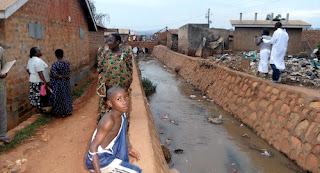After four months of being in Rwanda and Uganda, we have seen MicroGrants take off in communities that have never before had the chance to develop their own social projects. We have seen women in Uganda transform from subsistence farmers wanting assistance, to an empowered and proactive group who are building their own school for children and pressing their local government for support. Communities in Rwanda have debated and drawn up their own proposals around safe water, electricity, food security, animal rearing and economic development. Three projects are being implemented, three groups are developing their proposals, two are starting the process soon and many more are being surveyed who we would love to work with.
Implementing Projects:
- In Bukomero, Rwanda, the animal projects have begun; chickens, goats and pigs are now in the hands of the women and men who designed proposals for the projects. In the next few months we will see if the animals remain healthy, give birth and are passed on. In six months we will determine if the first round of animal owners (59 families) will have seen an increase in profit, individuals in the household with health insurance and children in school. Currently, ten of the families do not have their children in school, almost half of the group does not have health insurance and only one person is close to making a dollar a day, most families make under two dollars per month. The group is hoping that animals will help them with manure for their fields and a sustainable income source since they are manageable to raise, multiply and there is local demand.
- In Wanteete Village, Uganda, the women have purchased a piece of land to build their school on. They are collecting building materials and tending to their garden and pig project that they have started.
- In Karambi Village, Rwanda, the community has started digging their water well and members are building the structure for the water tank.
Developing Proposals:
- In Ruhango, Rwanda, a community is in their first stage of project development where community members are discussing how to get electricity into their village.
- In Kigundu Zone, Uganda, women have developed their proposal for stopping the flooding that invades their homes and paths during the rainy season. They are going to review feedback from engineers this week to help them plan their trench.
- Outside of Butare, Rwanda, women have been developing tens of project proposals to fight poverty through a communal business. Last week they reorganized and groups with similar projects collaborated on new and improved proposals. There are now seven groups developing proposals for different projects, including animal rearing, a wholesale beverage business and a hostel for students.
Starting soon:
- A new MicroGrant opportunity will be presented to a group of youth in Uganda who are struggling to find education and jobs.
- In Rwanda, a new MicroGrant will start with a highly impoverished and isolated community near the Virunga volcanoes.
More being surveyed:
In the past two weeks we have visited a number of HIV Associations throughout Rwanda. Some have been given support, such as health insurance coverage and machines for grinding grains, but others are new and struggling with stigmatization, food security, poverty and physical weakness. Each group presented their situation to us, to describe their lives, their struggles and their joys. Every single association has pointed to three big problems. The first one is that people with HIV/AIDS are still heavily stigmatized. There are many people who live with HIV but only the poor ones join the association. Some members described that when they tried to take out a loan or have a neighbor help them they would be denied because there is a general sentiment that it’s not reliable to give someone with HIV/AIDS support – because they might die tomorrow or before the loan is repaid. The second major problem is malnutrition. Families need more food with more diversity. The third problem is that of poverty and physical weakness. They cannot afford to cover all of their basic needs, such as health insurance and the 15% of health care fees that are mandatory when they go to the clinic for something other than an 'essential' medicine, such as ARVs.
We have also discussed about groups in the northern Musanze District in Rwanda where the soil is rich but malnutrition is rampant. Ernest, an aspiring journalist and recent University graduate is living in the area and knows the communities well. He is engaged with supporting anyone who wants to help them develop.
While these groups (and many more) are appealing to work with and would benefit immensely from a MicroGrant, we need to raise more support for Spark MicroGrants before we engage with them. By the end of January 2011 we need another $20,000 to engage six new communities. Lets see if we can do it!







